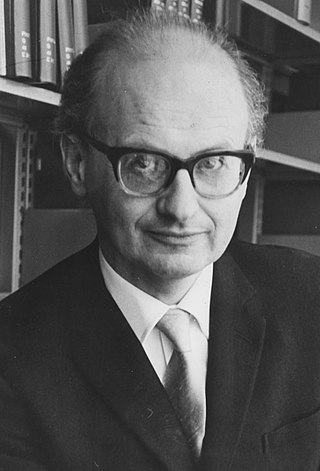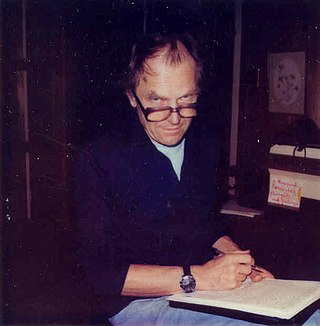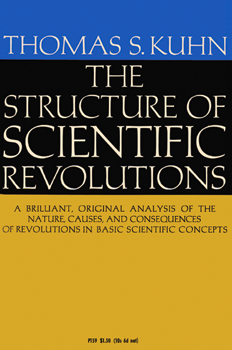Related Research Articles

Falsifiability is a deductive standard of evaluation of scientific theories and hypotheses, introduced by the philosopher of science Karl Popper in his book The Logic of Scientific Discovery (1934). A theory or hypothesis is falsifiable if it can be logically contradicted by an empirical test.
Logical positivism, later called logical empiricism, and both of which together are also known as neopositivism, is a movement whose central thesis is the verification principle. This theory of knowledge asserts that only statements verifiable through direct observation or logical proof are meaningful in terms of conveying truth value, information or factual content. Starting in the late 1920s, groups of philosophers, scientists, and mathematicians formed the Berlin Circle and the Vienna Circle, which, in these two cities, would propound the ideas of logical positivism.

Observation in the natural sciences is an act or instance of noticing or perceiving and the acquisition of information from a primary source. In living beings, observation employs the senses. In science, observation can also involve the perception and recording of data via the use of scientific instruments. The term may also refer to any data collected during the scientific activity. Observations can be qualitative, that is, the absence or presence of a property is noted and the observed phenomenon described, or quantitative if a numerical value is attached to the observed phenomenon by counting or measuring.

The scientific method is an empirical method for acquiring knowledge that has characterized the development of science since at least the 17th century.
Philosophy of science is the branch of philosophy concerned with the foundations, methods, and implications of science. Amongst its central questions are the difference between science and non-science, the reliability of scientific theories, and the ultimate purpose and meaning of science as a human endeavour. Philosophy of science focuses on metaphysical, epistemic and semantic aspects of scientific practice, and overlaps with metaphysics, ontology, logic, and epistemology, for example, when it explores the relationship between science and the concept of truth. Philosophy of science is both a theoretical and empirical discipline, relying on philosophical theorising as well as meta-studies of scientific practice. Ethical issues such as bioethics and scientific misconduct are often considered ethics or science studies rather than the philosophy of science.

Imre Lakatos was a Hungarian philosopher of mathematics and science, known for his thesis of the fallibility of mathematics and its "methodology of proofs and refutations" in its pre-axiomatic stages of development, and also for introducing the concept of the "research programme" in his methodology of scientific research programmes.

Paul Karl Feyerabend was an Austrian philosopher best known for his work in the philosophy of science. He started his academic career as lecturer in the philosophy of science at the University of Bristol (1955–1958); afterwards, he moved to the University of California, Berkeley, where he taught for three decades (1958–1989). At various points in his life, he held joint appointments at the University College London (1967–1970), the London School of Economics (1967), the FU Berlin (1968), Yale University (1969), the University of Auckland, the University of Sussex (1974), and, finally, the ETH Zurich (1980–1990). He gave lectures and lecture series at the University of Minnesota (1958-1962), Stanford University (1967), the University of Kassel (1977) and the University of Trento (1992).
In philosophy of science, confirmation holism, also called epistemological holism, is the view that no individual statement can be confirmed or disconfirmed by an empirical test, but rather that only a set of statements can be so. It is attributed to Willard Van Orman Quine who motivated his holism through extending Pierre Duhem's problem of underdetermination in physical theory to all knowledge claims.
In philosophy of science and in epistemology, instrumentalism is a methodological view that ideas are useful instruments, and that the worth of an idea is based on how effective it is in explaining and predicting natural phenomena. According to instrumentalists, a successful scientific theory reveals nothing known either true or false about nature's unobservable objects, properties or processes. Scientific theory is merely a tool whereby humans predict observations in a particular domain of nature by formulating laws, which state or summarize regularities, while theories themselves do not reveal supposedly hidden aspects of nature that somehow explain these laws. Instrumentalism is a perspective originally introduced by Pierre Duhem in 1906.
Scientific realism is the view that the universe described by science is real regardless of how it may be interpreted. A believer of scientific realism takes the universe as described by science to be true, because of their assertion that science can be used to find the truth about both the physical and metaphysical in the Universe.
Empirical evidence for a proposition is evidence, i.e. what supports or counters this proposition, that is constituted by or accessible to sense experience or experimental procedure. Empirical evidence is of central importance to the sciences and plays a role in various other fields, like epistemology and law.

The Structure of Scientific Revolutions is a book about the history of science by philosopher Thomas S. Kuhn. Its publication was a landmark event in the history, philosophy, and sociology of science. Kuhn challenged the then prevailing view of progress in science in which scientific progress was viewed as "development-by-accumulation" of accepted facts and theories. Kuhn argued for an episodic model in which periods of conceptual continuity where there is cumulative progress, which Kuhn referred to as periods of "normal science", were interrupted by periods of revolutionary science. The discovery of "anomalies" during revolutions in science leads to new paradigms. New paradigms then ask new questions of old data, move beyond the mere "puzzle-solving" of the previous paradigm, change the rules of the game and the "map" directing new research.
In philosophy of science and epistemology, the demarcation problem is the question of how to distinguish between science and non-science. It also examines the boundaries between science, pseudoscience and other products of human activity, like art and literature and beliefs. The debate continues after more than two millennia of dialogue among philosophers of science and scientists in various fields. The debate has consequences for what can be termed "scientific" in topics such as education and public policy.
Commensurability is a concept in the philosophy of science whereby scientific theories are said to be "commensurable" if scientists can discuss the theories using a shared nomenclature that allows direct comparison of them to determine which one is more valid or useful. On the other hand, theories are incommensurable if they are embedded in starkly contrasting conceptual frameworks whose languages do not overlap sufficiently to permit scientists to directly compare the theories or to cite empirical evidence favoring one theory over the other. Discussed by Ludwik Fleck in the 1930s, and popularized by Thomas Kuhn in the 1960s, the problem of incommensurability results in scientists talking past each other, as it were, while comparison of theories is muddled by confusions about terms, contexts and consequences.
In the philosophy of science, underdetermination or the underdetermination of theory by data is the idea that evidence available to us at a given time may be insufficient to determine what beliefs we should hold in response to it. The underdetermination thesis says that all evidence necessarily underdetermines any scientific theory.

In philosophy of science, the Duhem–Quine thesis, also called the Duhem–Quine problem, posits that it is impossible to experimentally test a scientific hypothesis in isolation, because an empirical test of the hypothesis requires one or more background assumptions : the thesis says that unambiguous scientific falsifications are impossible. It is named after French theoretical physicist Pierre Duhem and American logician Willard Van Orman Quine, who wrote about similar concepts.
Inductivism is the traditional and still commonplace philosophy of scientific method to develop scientific theories. Inductivism aims to neutrally observe a domain, infer laws from examined cases—hence, inductive reasoning—and thus objectively discover the sole naturally true theory of the observed.
Conventionalism is the philosophical attitude that fundamental principles of a certain kind are grounded on agreements in society, rather than on external reality. Unspoken rules play a key role in the philosophy's structure. Although this attitude is commonly held with respect to the rules of grammar, its application to the propositions of ethics, law, science, biology, mathematics, and logic is more controversial.

Evidence for a proposition is what supports the proposition. It is usually understood as an indication that the supported proposition is true. What role evidence plays and how it is conceived varies from field to field.
An index list of articles about the philosophy of science.
References
- 1 2 3 4 Bogen, Jim (2014): "Theory and Observation in Science", In: Edward N. Zalta (ed.), The Stanford Encyclopedia of Philosophy (Summer 2014 Edition).
- ↑ Van Fraassen, Bas C. (2008). Scientific Representation: Paradoxes of Perspective. Oxford: Clarendon Press. pp. 283–284. ISBN 9780199278220.
- ↑ Andersen, Hanne; Green, Sara (2013). "Theory-Ladenness". Encyclopedia of Systems Biology. Springer. pp. 2165–2167. doi:10.1007/978-1-4419-9863-7_86. ISBN 978-1-4419-9863-7.
- ↑ Reiss, Julian; Sprenger, Jan (2017). "Scientific Objectivity". The Stanford Encyclopedia of Philosophy. Metaphysics Research Lab, Stanford University.
- ↑ Lee, James Soo (August 2017). "IV. Metaphysical Beliefs and Persisting Disagreement". A Metaphysician's User Guide: The Epistemology of Metaphysics (PhD thesis). Syracuse, NY: Syracuse University.